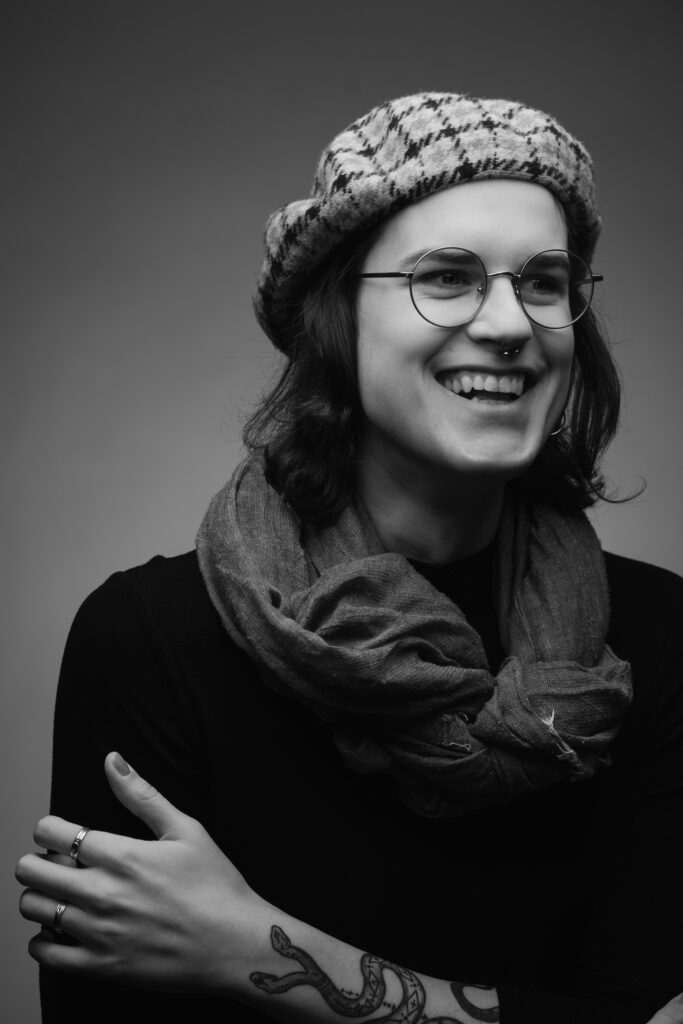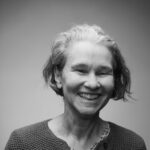Introduction by Mia Pohlman
Telling someone you look up to them involves risk. But, we believe in being straightforward in our admiration of others, letting people know when we think there is something cool about them. We also are always up for knowing another interesting person in our community, and it’s usually true that the people we think are awesome know other awesome people we don’t yet know.
So, to learn more about what the people we already know value, and to also meet new friends, we asked Aaron Eisenhauer, whom we admire, to ask someone he admires to have a conversation. Here, we introduce you to Aaron so she can introduce us to Zelda. This conversation has been edited for the sake of space and coherency.
Photographer and videographer Aaron Eisenhauer is a maker of space. He is thoughtful in caring for others, as well as in finding the gaps and going into them, in pursuit of making a project, idea or person the strongest version of itself. He is a recommender of the best books, listener of the coolest music, asker of the most insightful clarifying questions; when he speaks, you know you’ll want to listen. Here, he sits down with software engineer Zelda Mazur to talk about her creative work and experience of being transgender in Southeast Missouri.
————
Intro and interview by Aaron Eisenhauer
I first met Zelda Mazur approximately five years ago. We worked in similar positions in the same small industry, video production and marketing. We met in passing a few times and connected on social media, where I learned she’s also a talented musician and artist.
Then I heard she’d left her job in the creative field, which she was very good at, and become a programmer. From the outside, it looked like things were going great. By all accounts, she was good at her job. Why the change? I can’t say I thought about it too much. Everyone deals with their own internal issues and needs to figure out what’s best for themselves. For the most part, everyone respects that.
Zelda is a transgender woman. Before we talked, I asked her if she was comfortable talking about her gender history. She was. Apparently, it was me who wasn’t, because after talking about her creative and professional life, I thought we’d had a pretty good conversation, and I was ready to call it. I guess I thought maybe the career transition was a close enough proxy, and if you know, you know. As if changing career paths, a practice that is generally accepted if not applauded by society, could speak any sort of truth about what it’s like to transition from living as a man to living as a woman, changing your very name, rectifying a fundamental part of yourself, and placing yourself in a maligned demographic.
It’s not the same. But it is the same. Everyone deals with their own internal issues. We’re all just trying to figure out how to be. I’m grateful for Zelda’s openness.
But first, I asked about playing the drums.
I see you on social media, and I see a lot of your creative endeavors. And I’m always just like, “Of course she is. Of course she can play drums.” Or whatever it is …
That was, like, my first creative endeavor. I got a drum set when I was nine, and that was the first instrument I learned to play, and I played it until I graduated high school. I didn’t do anything with it after that, but I still have all the muscle memory from it. So when I go to someone’s house and they have a drum set, I’m just like, “Let’s do this.” So I was a musician first. That was what got me into creating.
What is it about music and the act of creating that you like?
As far as music is concerned … it’s just more of a stress relief than a stress-inducing activity. Like, if I’m having a stressful day, I know I can release all that tension into something that decorates time and space in a way. I don’t know who said the quote [“Art is how we decorate space, music is how we decorate time,” by Jean-Michel Basquiat,] but, yeah … It’s just stress relief, honestly.
When you were nine, that probably wasn’t what you were thinking …
Oh, no. I was like, “I’m going to be the best drummer in the world” when I was eight, and then I picked up piano when I was 10, and my mom really pushed me to get good at it. So, I played it all through, like, high school. … I haven’t taken it seriously since I was 18.
So, did you want to be a professional musician when you were a kid?
I mean … I had dreams of it. But the older I got, the more I realized, like, no. I don’t want to do this forever. It’s just a lot to … once you start actually taking it seriously, it becomes — and I’m going to get into this later — it becomes a chore. And that’s what kind of killed it for me. When I did start trying to take it seriously, I was like, OK, I need to really just chill and to not.
Has that happened in other areas?
Yes. That’s why I ultimately ended up leaving the creative field altogether. When I first started working in video and photography at my first job … it was awesome. And I was like, “Wow, I can’t believe I get to do this for money.” But the more I did it, the more it became a chore … Being forced to be creative eight hours a day was draining for me. It just completely took out any [desire] to do anything creative when I got home, and that was the point where I was like, I have to switch careers.
Tell me about that. About switching careers.
I went to school for computer science and ended up not doing anything with it. … I got the job at Creative Edge right out of college. I was there for a few years and ended up switching to Red Letter. So, it was during that time where I would go home and be creative and do side work. Or, I would draw. I would write music. I would play music. I eventually got to the point where I didn’t want to be creative when I got home, because I spent so much time doing that [at work]. It was at that point that I decided, “Alright, I need to do something with computer science.” And so, I went to Codefi and took their coding class, and it just completely changed my life. Like, holy crap, that was the best decision I ever made.
It feels like programming would still be creative on some level.
It is. You’re not just solving equations. There’s no set formula or something. You have to know the fundamentals, yes, but you’re constantly coming up with clever solutions. How do you make it faster? How do you make it use less memory? How do I make this better for the user experience? And then you also have the user interface, too. So like, that’s a creative portion, as well. I get to do design and stuff, too. But I can go home, and I can play the piano or draw something and not have the creativity just sucked out of me beforehand. I can finally be creative to relax. … It’s awesome.
And it’s still fulfilling?
It is fulfilling. Solving problems is the most fulfilling part, even if I’m not solving world hunger. Like, fixing a bug, getting a button to work or fixing an issue that a user is having. Finding it, hunting it down and making it work. … Every time, that feeling doesn’t go away. Like, “Yes! It finally works!” That feeling never goes away.
Do you have any goals right now?
I mean, not to make myself sound like I have no aspirations, but I guess my biggest goal right now is to learn how to take life slow and enjoy moments as they come. … Like, when you’re constantly waiting for that next thing, you are not enjoying the things that you have. Yeah, I want to get my master’s degree. But that’s not going on my tombstone. Like, that’s not what people are going to remember me by. If I’m going to leave a legacy, I want people to remember me for my kindness and not for what I did for work. Nobody cares about that at the end of the day. “Yeah, we’re going to miss her, but she made a killer sorting algorithm. You should have seen it.”
My answer probably would have been different if you asked me seven years ago. I would have been like, “Oh, yeah, I’m gonna be like the best animator ever, or whatever.” No. It’s not the same anymore. I want to have a profound impact on people in a positive way. I think the biggest legacy that we’re leaving behind is in people. Not necessarily the things you accomplished. Those two things aren’t mutually exclusive, but, like, you leave a piece of yourself behind in every single person that you meet.
Is there anything else I should ask you? Is there anything else you would want people to know?
If you’re interested in the elephant in the room, like the transgender stuff, ask away. I’m a very open book. There aren’t a whole lot of us in Cape, so I feel like people aren’t really exposed to people like me. So, if you’re interested, or if there’s anything you think the readers of flourish would like to hear, I’m more than happy to answer it.
Yeah, I think … I was a little bit undecided if I wanted to talk about the elephant. But I do think that’s one of the things I find admirable about you. You are living as your true self, your authentic self.
It was really hard at first. I mean, it’s still hard. It’s a lot less hard now, but like, I knew from a very young age that this is what I … this is what I wanted.
It has definitely influenced me as a person more than any other facet of my life. More than the creative, software engineer, musician stuff. Since I came out, it’s been over two years now, my life has changed in more ways than I previously could have thought. I’m way happier. Well, “happy” is not the right word. I’m just … there’s a lot that I’m just not worried about anymore. Like, this constant anxiety and unhappiness with … like, this dislike of my body that I didn’t understand fully until I was in my 20s. [I was] trying to be the manliest man that I could be and working out all the time. Like, I used to be ripped. It was never enough. I just had this unhappiness with my body that I didn’t understand. It didn’t reflect my gender identity.
So, what was that like? Like, it sounds like you almost didn’t know what was going on when you were younger …
It was less of “I’m a girl” and more of “Man, life would be so much easier if I would have been born a girl.” Which … I don’t know. I didn’t have … there wasn’t enough good positive media portrayals and representation when I was growing up to think that transitioning would ever be a viable option, too.
The way we’re negatively portrayed in the media, it’s often like a punchline. In so many movies … we’re often viewed as caricatures or a laughing matter. This is something I’ve come to terms with, too. This is not a sob story or anything. This is just the reality. Stuff like that led me to believe that it was never a viable thing growing up. And then actually meeting and talking to actual trans people and hearing their stories and becoming friends with them is what led me to eventually think like, “OK, maybe I can actually do this.” And I did. I took the leap. I started taking estrogen, and it’s been almost two and a half years now.
It’s hard. Like, living as one thing at home, and then having to go out and, like, put on this costume, this man costume was … it got to be too much after a while. And then eventually, I just took the plunge. Started telling my close friends about it, and it just snowballed from there, to where I just couldn’t shut the [expletive] up about it. [laughs]
So, how does it feel now?
It feels great. It’s one less thing, like, a weight off my shoulders. I don’t have to think about it anymore. Like, I have the same issues that cis women face now, like harassment and stuff. You know, all the good stuff, right? … It’s just one less thing for me to have to worry about. Every day, I can focus on doing the things that I’m good at. You know, when you’re unhappy, you’re not doing your best work. And now, I would argue, in the past two years, I’ve done some of the best work that I have ever done in my entire life. … I’ve done so much because it’s just like one less thing that’s sucking my energy away. When you’re not living as your authentic self, you’re just anxious all the time. It’s just one less thing to be anxious about.
Whenever you look back on your life and you look at who you used to be, how do you feel about that person?
Oh, man. I don’t even recognize him in photos anymore. It’s so bizarre. I know that this was me, and if I look at a photo, I can remember exactly where I was when I took this photo, and I remember what I was doing, but it just seems like … it just seems like it was somebody else. It’s so weird.
Is that hard for you?
No. I don’t think so. I mean, maybe at first, I thought I was letting go of a lot of stuff. But … I’m more than that. I am the sum of the things that I’m interested in, not the body I reside in. My body is probably the least interesting part of me. So … it’s not hard.


